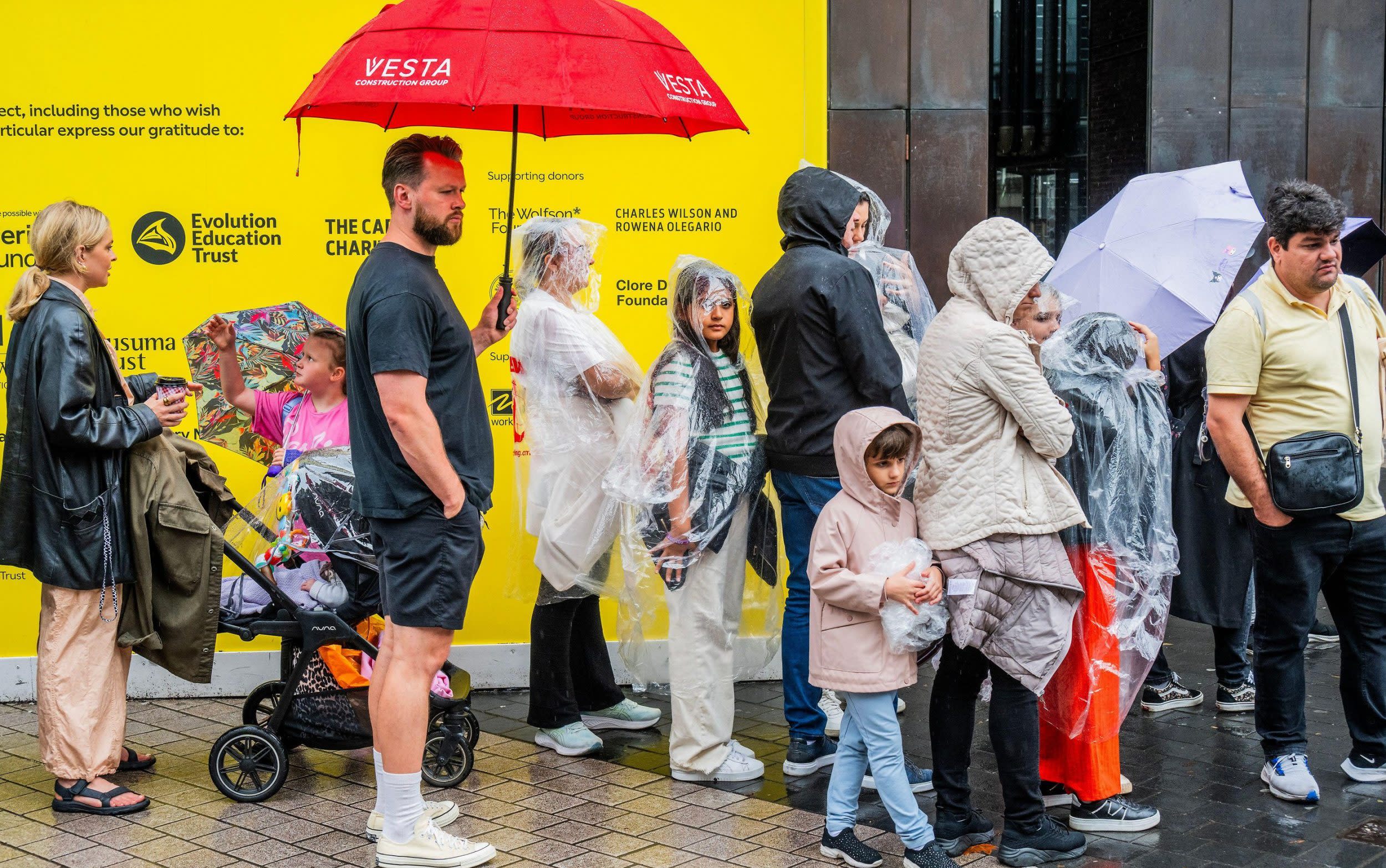The UK is facing a £2.8bn shortfall in overseas visitor spending, with annual arrivals still down on pre-pandemic numbers. According to a new report by the Centre for Economics and Business Research (CEBR), Britain attracted 38 million tourists in 2023, down from a 2019 peak of 40.
9 million. Projections for 2024 suggest only a slight improvement, to 38.7 million.

Furthermore, spending by tourists has also declined by 8 per cent, translating to a £2.8bn dip when adjusted for inflation. While the CEBR cites “general cautiousness surrounding international travel,” it also says that Britain is being outperformed by its main competitors in Europe.
“The UK is falling behind its closest competitors as a tourist destination,” the report said. According to the latest United Nations World Tourism Organization (UNWTO) statistics, UK visitor numbers in 2023 were still 5.6 per cent down on 2019, placing the country towards the bottom of the European table when it comes to growth – below France, Spain, Turkey, Greece, Netherlands and Croatia, among others, though faring better than Italy and Germany.
So why such a slow uptick, and why are other countries having more success? Some of the factors underpinning a tourism slump are obviously to do with the cost of living crisis, by no means a domestic affair. Britain is not a budget holiday option. The World Economic Forum ranks the UK 113th out of 119 countries for price competitiveness of travel and tourism.
Food and transport in particular are expensive, and this will inevitably deter some people who might otherwise come. The CEBR report says that overall prices in the UK for 2024 are expected to be 23.5 per cent higher than in 2019, with accommodation costs up by 35.
8 per cent, restaurant prices by 28.7 per cent, and airfares by 47.6 per cent.
For those who watch the news, the UK has not had the best promotional campaigns. , rising knife crime, chaos on the railways and even the axing of HS2 are hardly enticing images. Joss Croft, CEO of UKInbound, which represents more than 450 firms that host, transport, guide, and feed international visitors, says a large survey of summer bookings is “quite strong” for 2024 – with 85 per cent of members saying it’s the same or better than 2023.
“However, confidence for the next 12 months has dipped quite significantly since April,” he adds. “All tourism relies on the three elements of means, money and motivation. For means, the UK insists on passports for EU travellers – this is impacting the youth and student travel sector particularly.
Visa costs are high and going higher, and . “Our reputation for welcome is poor and given that the two biggest motivators for international travel are ‘will I be welcome’ and ‘will it be value for money’, the UK is weak at the moment. VAT on hospitality is higher than pretty much anywhere in Europe and the UK also removed tax-free shopping [a factor cited in the CEBR report], making competitors better value for money.
Visitors are coming, but they are spending less time and less money here.” In the most recent Anholt-Ipsos report on Nation Brands, the UK’s “Welcome” ranking fell to 19th place out of 60 nations – the lowest ever received for this measure. In this context, “Welcome” refers to factors such as “Positive interaction with locals”, “Helpful hotel staff”, “Friendly service in restaurants”, “Stress-free airport experience”, “Ease of getting around” and “Smiling faces”.
Oxford Economics forecasts that the UK will fall further in terms of its international tourism reputation, not only globally (where is the fastest growing region) but also against its major western European rivals. VisitBritain CEO Patricia Yates acknowledges the challenges. “Tourism is a competitive global industry and visitors have a lot of choices,” she says.
“Britain always ranks highly for its history and heritage and contemporary culture and sport, but perceptions are not as strong for its natural beauty and perceived welcome. “The latter is a top driver in destination choice. To counter this, VisitBritain’s international GREAT campaigns showcase our welcome, inspiring visitors to discover more of Britain, stay longer and to drive that sense of urgency to come now.
“On policy matters, EU travellers used to be able to travel to the UK using just their ID card but they are now required to use a passport, which not all EU visitors own. And we are soon to see the introduction of the Electronic Travel Authorisation scheme. “We are working with the Home Office to ensure the rollout is well communicated.
We’re also working with partners across our overseas markets so they have the latest details and to give visitors the clarity they need to plan and book their visits with confidence.” There is no question that UK tourism is recovering – but the pace is slower than the industry hoped. Visitor numbers are behind government targets outlined in its 2021 Tourism Recovery Plan, and slower than in other parts of the world, including Europe.
The Government’s target was to recover inbound numbers to 2019 figures by the end of 2023, but all the data indicates the UK won’t hit that target even by the end of 2024. Richard Toomer, Executive Director of the Tourism Alliance – an umbrella organisation for more than 70 associations and bodies – says the Government ambition was the right one, but policies have hindered it. “An absolutely key one was the decision to abolish tax-free shopping for international visitors.
We are now the only major European destination not to offer this service, which is a key driver for many long-haul visitors,” he says. “Our retail, hospitality and tourism businesses are really feeling the effects. Many tourists are now diverting their visits and spending to Paris or or cutting short their UK trip and saving their spending until they go to Europe.
Bringing this back and extending it to EU citizens would be worth £10bn annually and would boost tax revenue by £4bn a year. “Our visa regime is awfully uncompetitive and rather than tackling it, the previous Government kept hiking visa fees further and further. A two-year visitor visa is now £432, a five-year visa is £771.
A Schengen visa costs €90 and of course allows tourists to visit multiple countries on one visa. Our application process is also cumbersome and time-consuming.” Travelling in both directions between the EU and the UK is about to get more bureaucratic and more costly.
Both the UK and EU are implementing new border regimes to tighten up on security but which will impact travellers. For inbound non-visa nationals they will need to apply for an ETA before travel at a cost of £10 per person, including those merely connecting at a UK airport. This will be yet another cost and barrier to people choosing to come to the UK.
Toomer says that the new Government has an opportunity to reset: “We’re calling on the Government to work with the industry on a new Sustainable Tourism Growth Plan which is ambitious in its targets, and crucially backs up aspiration with good policy-making. The Labour Government has also which we would like to go further into an EU-UK Mobility Agreement which does not reopen Brexit debates, but would make travel and trade between the two jurisdictions easier for leisure and business travellers alike.” VisitBritain’s marketing budget stands at around £18 million annually, compared to over €80 million (£67 million) for Ireland, despite the fact that tourism – according to the Government’s own figures – delivers an impressive £21 of additional spend for every £1 invested.
If just £1 was allocated from each ETA, VisitBritain could deliver substantial returns for the UK economy. The biggest challenge for the Government might be to do with tone. It’s all very well using recent history and the narrative of “broken Britain” to support new policies – but it might be best to whisper it so would-be foreign visitors don’t keep spinning the globe to find a more attractive holiday destination.
Most Australians have a clichéd view of Britain, mostly shaped by news coverage of the Royal Family and sporting events such as Wimbledon and the Ashes. Coverage of UK politics is virtually non-existent. Australians are suffering from cost of living pressures and looking for travel bargains; with a weaker Aussie dollar the UK is seen as an expensive destination.
Cheap long-haul flights have also largely disappeared. But many young Australians are now applying for working visas in the UK, which are now easier under post-Brexit rules. A couple of years in London is still seen as an important rite of passage after leaving university – and a handy base from which to explore Europe.
Coming from a fairly chaotic country, Greeks love the British sense of order (“They stand in line to catch the bus! They say ‘sorry’ when they bump into you!”). They also love Sherlock Holmes and shopping in Harrods – they even love the climate (!). Most Greeks would leap at the chance to visit the UK, and high prices (food and accommodation) are more likely to put them off more than knife crime (Greeks generally feel they have more reason to fear the behaviour of the British when they’re on holiday here in Greece, than when they’re in their home country).
Tourists have historically been drawn to the UK for its castles and culture (think Harry Potter, not Made in Chelsea). But most Americans I know have been to the UK and are looking farther afield for travel. I think this drop is less about Britain losing favour (though I do hear regular complaints about pub food from those who do go) than other places rising in popularity: Americans I know are travelling to Japan, Iceland, Denmark, Italy, Switzerland.
.. While I have noticed this anecdotally, data bears out the shift: year on year, American tourism in Japan was up 17.
4 per cent in the first few months of 2024, and 35.5 per cent up on 2019. The Germans I know or have spoken to about visiting the UK don’t have any specific issues with it and speak rather fondly of their own experiences.
There has, inevitably, been a slight dimming of enthusiasm since Brexit and the associated delays, visa issues and general anti-European sentiment, but we have had plenty of rail strikes, delays and cancellations here of late (Deutsche Bahn has been on a downhill slide for a while) and most don’t even know about London’s knife crime and Britain’s polluted waters. In summer, most Germans seem to be put off by the idea of rainy weather more than anything, especially as they can explore the rest of Europe, including the sun-filled south, more easily. I expected to open floodgates asking my all-French office what they thought of visiting the UK at the moment.
Certainly, they miss no opportunity to tell me that our food and weather are rubbish. While neither of these factors make me reluctant to come back to the UK, the state of our public transport does; I can’t remember the last time I visited and my trains ran to time (ironic, as 10 years ago I’d have been saying this about France). The answer, though, was much more simple.
“Passports,” says my colleague. “We can use our ID cards all over the European Union, but now we have to remember to renew our passports to come to the UK.”.



















